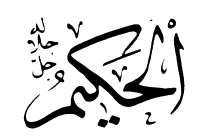One of the names of Allah s.w.t is al-Hakeem - the Most Wise - and part of His wisdom is manifested in the Divine Laws that He imparts to us through the Quran. In fact in surah YaaSiin (among other places), He even says that the Quran itself is wisdom.
As Muslims, we must believe that there is wisdom in each and every command that Allah gave us in the Quran, from issues like, say, the prohibition of riba (usury), the need to cover one's 'aurah, fasting, the five daily prayers and the list goes on. Basically, everything that Allah commands us to do has wisdom in it and is for our own good.
However, there are people in the post-modern society that we live in today who start to second guess the Laws of Allah, claiming it no longer relevant and is inappropriate for the 'modern' society. Some even say it's barbaric! Astaghfirullah, may Allah have mercy on them. This is because in these people's minds, they fail to see the logic - and by extension, the wisdom - behind these Laws.
What does Allah s.w.t has to say about this? In the Quran, He says:
وَلَوْ أَنَّا كَتَبْنَا عَلَيْهِمْ أَنِ اقْتُلُوا أَنفُسَكُمْ أَوِ اخْرُجُوا مِن دِيَارِكُم مَّا فَعَلُوهُ إِلَّا قَلِيلٌ مِّنْهُمْ وَلَوْ أَنَّهُمْ فَعَلُوا مَا يُوعَظُونَ بِهِ لَكَانَ خَيْرًا لَّهُمْ وَأَشَدَّ تَثْبِيتًا
If We had prescribed upon them to kill themselves or to leave their homes, very few would have done it: But if they had done what they were advised to do, it would have certainly been best for them, and would have gone farthest to strengthen (their faith) [Surah an-Nisa', 4:66]
Think about the above aya for a bit. It says "to kill themselves or to leave their houses". What logic is there in such commands? If anything, the logical mind would say that it is madness. Of course, Allah didn't command any of these to us, He was just proving a point, that is; "if We had prescribed upon them... it would have certainly been best for them".
In this aya, we learn that there are times when our limited intellect are just unable to grasp the logic behind certain things that Allah reveals to us. We may not understand it or even see the wisdom behind it, but know for sure that it is definitely, definitely better for us. Why? Because Allah is al-Hakeem, He is the Most Wise and He knows what is best. And that answer should be enough for us if we truly believe in Him.
May Allah give us the correct understanding of His Deen and the Quran, and may Allah guide us to and along the straight path.
Wallahua'lam














